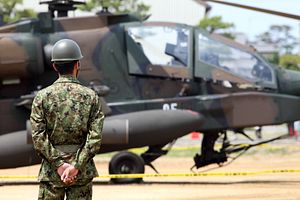Alongside a raft of economic proposals reported in the press, Prime Minister Shinzo Abe’s ruling LDP government is also pressing its junior coalition partner, New Komeito, for progress on collective self-defense. Abe is eager to have this reinterpretation of Article 9 of the Constitution agreed before the end of the current Diet session on June 22. However, New Komeito is proving to be unyielding in its resistance to such far-reaching changes.
In light of the slow progress of the coalition’s talks, the LDP has withdrawn the previous criteria that would allow for Self-Defense Forces to provide logistical support to multinational forces, and instead proposed three new conditions. According to the Japan News, during coalition talks last Friday, the government suggested these three conditions: “The SDF will not provide logistic support in a zone where there is already ongoing combat, it will immediately suspend support and leave an area if it becomes a combat zone, and it will be allowed to conduct search and rescue operations in combat zones for humanitarian purposes as exceptions.”
These conditions are in response to New Komeito’s strong opposition to previous criteria the LDP had proposed for the use of SDF support. The key difference now in deciding if the SDF will be able to provide assistance, is whether or not combat has already begun. The Japan News reported that New Komeito promised to look into the new conditions, and that the two partners began discussions on eight new scenarios that would require collective self-defense.
Also last Friday, the coalition reached an agreement on two of three possible “grey-zone issues.” They included the landing of armed foreigners on remote Japanese Islands, and a Maritime Self-Defense Force ship encountering unlawful acts against a civilian Japanese vessel by an armed group on the open water, according to the Jiji Press. In regard to these scenarios, the government plans to improve cooperation among police, coast guard, and the MSDF, and to streamline procedures for issuing orders to relevant agencies.
Talks are set to resume between the two partners this week, and on Monday Abe attempted to set the tone by urging both parties to reach an agreement on the larger issue of collective self-defense, while speaking before reporters. If they can reach an agreement before June 22, Abe told a Diet committee that the Cabinet will endorse the decision. He also stated “that the SDF will not be sent abroad for combat and that the Diet will be involved in any decision on deploying the SDF.”
However, government sources who spoke with the Japan Times were less optimistic. They said the “government might leave judgment on whether to legalize Japan’s use of the right to collective self-defense to future debate.” This would allow the government to save face by not mentioning plans to change to constitution when it announces the new security policy. The sources said that Abe’s administration will say the right to collective self-defense is allowable under international law, and that Japan will continue to study it. Abe is still fully prepared to streamline the Cabinet’s decision making process, and on Sunday ordered government officials to draft a statement that, pending approval, would be put before the Diet by June 22. Chief Cabinet Secretary Yoshihide Suga said “the government will speed up the drafting process so the Cabinet can approve it if the ruling parties settle their differences.”
Neither the LDP or New Komeito appear to have given up their positions on collective self-defense, although the Abe government seems to be preparing for the eventuality that it may not get Cabinet approval by the end of the current Diet session. The fact that the LDP is moving from emphasizing specific scenarios where collective self-defense is necessary, and instead drafting conditions that offer a more limited role for the SDF, is telling. The two partners have also not been able to find much common ground on “grey-zone issues,” which New Komeito said before Cabinet talks began was something it was interested in addressing, before moving onto the larger issue of collective self-defense.
With less than two weeks before the Diet session ends, the chances of reaching consensus within the Cabinet appear to be getting more remote. Abe has done his best in recent weeks to play up Japan’s regional security role during the Shangri-La Dialogue, and by negotiating arms deals with Australia and Vietnam. New Komeito has proven to be more resilient on this issue than perhaps the LDP had expected. However, the government can be expected to push its agenda right until June 22.

































